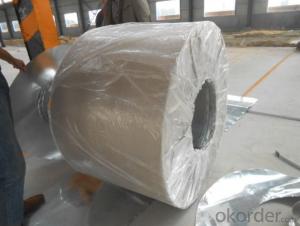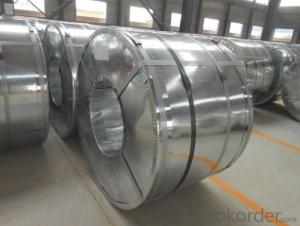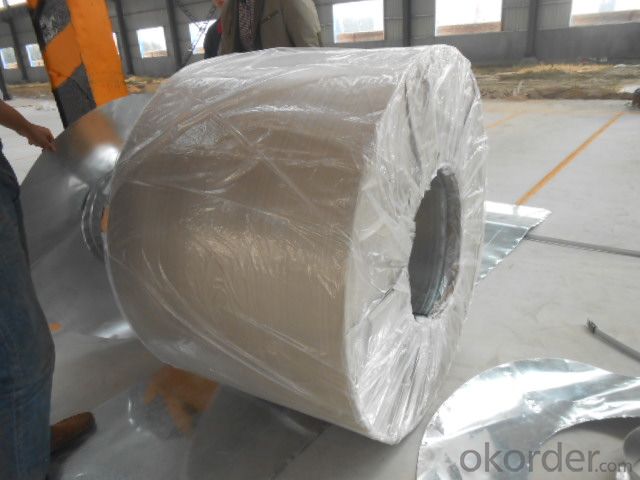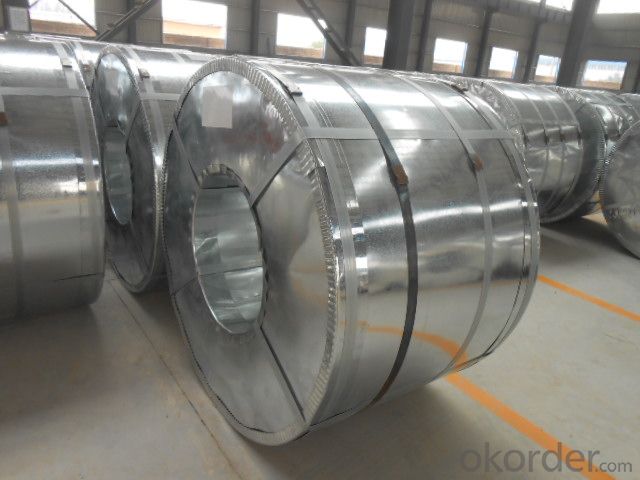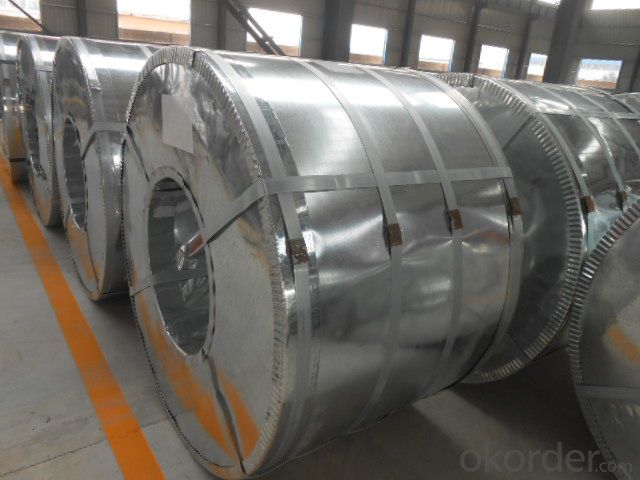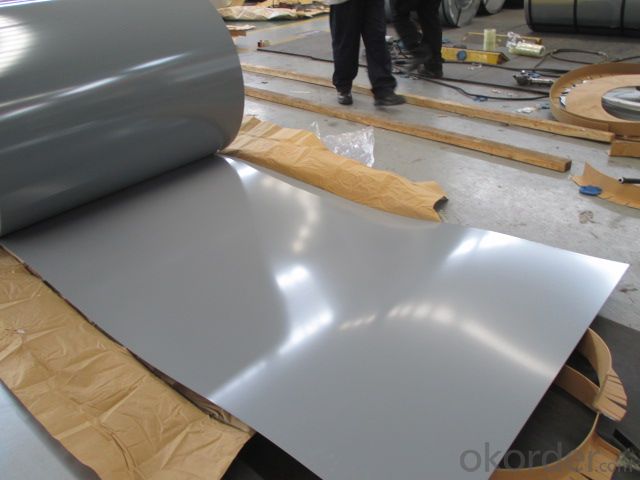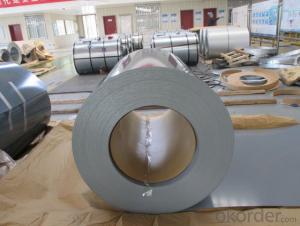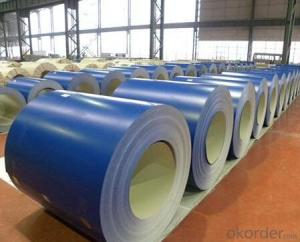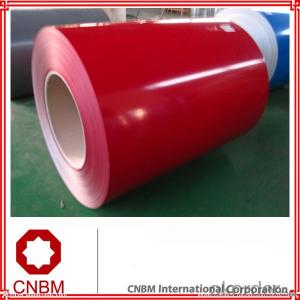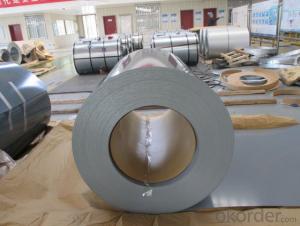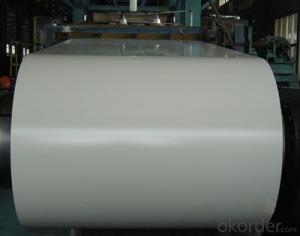PREPAINTED STEEL COIL zinc coating 80g/m2
- Loading Port:
- Tianjin
- Payment Terms:
- TT OR LC
- Min Order Qty:
- 100 m.t.
- Supply Capability:
- 10000 m.t./month
OKorder Service Pledge
OKorder Financial Service
You Might Also Like
PREPAINTED STEEL COIL
Packaging & Delivery
Packaging Detail: seaworthy export package
Delivery Detail: on request
Specifications
1. more than 10 years’ experience on this field
2. advanced equipments
3. competitive price
4. soonest delivery
Product Description :
Commodity
PREPAINTED STEEL COIL
Technical Standard: JIS 3312
Grade:CGCC
Types:Commercial / Drawing / Deep Drawing / Structural quality
Width: 900mm/1000mm/1219mm/1200mm/1220mm/1250mm
Thickness: 0.2mm~4.0mm
Type of coating: galvanized
Zinc coating: Z40-275g/m2,Z40-Z450g/m2
ID coil: 508mm or 610mm
Coil weight: 3-10/MT per coil
Package: Properly packed for ocean freight exportation in 20''container
Application:: home appliances, constructions, building, machineries
Our Advantages :
1. Expertise:
More than 10 years of manufacture: we know how to properly handle every step of production.
2. Competitive price:
We can offer competitive prices to our customers.
3. Accuracy:
We have excellent technicians and leaders, which can ensure our products are exactly what you want.
4. Materials:
All galvanized steel coils are made of high-quality raw materials.
5. Certificate:
Our products are certified by ISO9001.
6. Productivity:
We have large-scales of production lines,, which can guarantee all your orders will be finished in earliest time.
Hr CGL Technical Process:
Coil loading-> uncoiling-> cutting-> welding-> entry accumulator-> Heating and deoxidization-> galvanizing-> air cooling->water quenching-> air dryer-> tension leveler-> Passivation->air dryer->exit accumulator-> oiling-> cutting-> recoiling->coil unloading-> packing
The furnace heating style: improved Sendzimir heating technology
Hourly output: max.76.3t/h
Process after coating: tension leveling, Passivation or oiling
Our Service
Our quality
Test Equipments of Prepainted Galvanized Steel Coil : Salt-spray tester; Atomic absorption spectrophotometer; Rockwell typer hardness tester; Tensile test machine; Metrohm titration; Laboratory Bend test machine.
Our packing
Properly packed for ocean freight exportation in 20''container, galvanized metal fluted rings on inner and outer edges, galvanized metal & waterproof paper wall protection disk, galvanized metal & waterproof paper around circumference.
R&D department
R&D department concentrates on researching and developing reliable products with best quality. The quality department test and control every process of production to guarantee the best quality of product
- Q: All the steel straps that secure my deck and stair 6x6 posts to the concrete piers have some rust on them. Had bought a rust reducer to spray on them and repaint. As I went to do this I found that one of them is on its last legs, with the steel rusted through and bubbling up all up the sides of the straps. Since this is the end post on a row of 3 deck support posts, I was thinking of removing as much rust as possible, then paint with Rustoleum and cover lower post with something to keep water away from post and pier in the future? Was thinking of something removeable so I could check on it for further rusting. What do you folks with building experience think of this? Thanks.
- If these steel straps are rusting through and on their last legs, a coat of paint is going to be cosmetic at best. Replace these straps with new ones. The originals were either very poorly galvanized, or you live someplace with a very corrosive environment. In any event, paint can't save this sort of thing. Steel brackets serve a real purpose, and after they're weakened, they can't do that anymore. How would your home hold up in an earthquake, for example? What you're proposing doesn't sound safe.
- Q: How are steel coils processed and treated?
- Steel coils are processed and treated through a series of steps to ensure their quality and suitability for various applications. The process begins with uncoiling the steel coil, which involves removing the outer layers of protective wrapping and unwinding the coil. Once uncoiled, the steel is inspected for any defects, such as cracks or uneven surfaces. Next, the steel coil goes through a cleaning process to remove any dirt, oil, or rust present on its surface. This is typically done using a combination of chemical cleaning agents and mechanical scrubbing. After cleaning, the coil is rinsed and dried to prevent any residual moisture from causing corrosion. Once cleaned, the steel coil can undergo various treatments depending on its intended use. One common treatment is pickling, which involves immersing the coil in an acidic solution to remove impurities and scale. This process helps to improve the surface finish and prepares the steel for further processing. After pickling, the coil may be subjected to cold rolling, a process that reduces its thickness and improves its dimensional accuracy. Cold rolling involves passing the steel through a series of rollers at room temperature, gradually reducing its thickness and increasing its strength. This process also improves the surface finish of the steel coil. In some cases, the steel coil may undergo additional heat treatment processes, such as annealing or tempering. Annealing involves heating the coil to a specific temperature and then slowly cooling it, which helps to relieve internal stresses and improve its mechanical properties. Tempering, on the other hand, involves reheating the coil to a lower temperature and then cooling it rapidly. This process enhances the strength and toughness of the steel. Once the desired processing and treatments are complete, the steel coil may be coated or painted to provide additional protection against corrosion or to enhance its aesthetic appearance. Coating processes can include hot-dip galvanizing, electroplating, or applying organic coatings such as paint or powder coatings. Finally, the processed and treated steel coils are typically cut into specific sizes or shapes based on customer requirements. This can be done using various cutting methods such as shearing, slitting, or sawing. Overall, the processing and treatment of steel coils involve a combination of cleaning, pickling, rolling, heat treatment, coating, and cutting processes. These steps are carefully carried out to ensure the quality, strength, and suitability of the steel for its intended applications.
- Q: How are steel coils used in the production of medical equipment?
- Steel coils have various applications in the manufacturing of medical equipment. One way they are commonly used is in the production of surgical instruments. Scalpels, forceps, and clamps, for example, require a cutting edge that is both sharp and long-lasting. Steel coils are ideal for creating these edges as they can be easily shaped, hardened, and sharpened, ensuring precision and durability. Furthermore, medical devices like braces, orthopedic implants, and prosthetics often incorporate steel coils. These devices necessitate materials with exceptional strength and durability to provide support and stability to the body. Steel coils can be molded into different forms and sizes to meet the specific needs of patients, delivering the required support and functionality. Moreover, steel coils find application in the manufacturing of medical equipment such as MRI machines and X-ray systems. These machines rely on robust and dependable components to guarantee accurate imaging and diagnostics. Steel coils are integral to the construction of these machines as they provide stability and structural support, enabling precise and high-quality imaging. To summarize, steel coils are of utmost importance in the production of medical equipment as they offer strength, durability, and versatility. Whether it's surgical instruments, orthopedic devices, or diagnostic machines, steel coils are utilized to create dependable and high-performing medical equipment that ultimately enhances patient care and outcomes.
- Q: What are the common coil widths available for steel coils?
- The common coil widths available for steel coils vary depending on the specific application and industry requirements. However, there are several standard coil widths that are commonly available in the steel industry. These include: 1. 24 inches (approximately 610 mm): This is a common coil width used for various applications, including automotive manufacturing, construction, and general engineering. 2. 36 inches (approximately 914 mm): This wider coil width is often used in the construction industry for roofing and siding materials. 3. 48 inches (approximately 1219 mm): This wider coil width is commonly used in manufacturing processes where larger steel sheets are required, such as in the production of appliances, HVAC systems, or industrial machinery. 4. 60 inches (approximately 1524 mm): This wider coil width is typically used for specialized applications in industries such as automotive manufacturing, aerospace, or shipbuilding. It is important to note that while these are some of the more common coil widths, steel coils can be produced in custom widths to meet specific customer requirements. Additionally, the availability of coil widths may vary depending on the steel mill or supplier.
- Q: I have a white gold engagement ring, and to be special I thought I'd get a plain band from Tiffany's--in stainless steel. Can stainless steel be worn with white gold or will there be a difference in the color or texture? I'm not planning on getting them soldered together, but I don't want it to be noticeable that they are different metals. Does anyone have experience in this subject?
- I didn't know Tiffany's sold stainless steel rings. I think the colour might match, but the texture wouldn't really (from looking at all the stainless steel around my kitchen. The only way to know for sure is to go to Tiffany's and try it on with your ring. Why not consider a white gold band from Tiffany's? I don't know what the price difference would be on that. But you can get a white gold for around $250 from TCo.
- Q: What is the maximum stacking height for steel coils?
- The maximum stacking height for steel coils depends on several factors, including the weight and dimensions of the coils, as well as the storage facility's structural capacity. Generally, it is recommended to consult the manufacturer's guidelines or industry standards to determine the specific maximum stacking height for steel coils.
- Q: What's the length of a coil of cold rolled steel? Is there a standard?
- But in the process of production, not the large volume, a few kilometers long have. The small volume sold by the finished product is much shorter.
- Q: Where can a find a steel scrubber. Its great to clean cooking vessels. Would be great if someone gives me an idea. I did not find it at CVS, but was in a hurry, will try again tomorrow.
- I posted this earlier to a similar question... Really burnt on gunk in the bottom like milk or blackened food can easily be cleaned out of stainless steel pots and pans by sprinkling baking soda in the bottom, covering with vinegar, let simmer with a little water for 5 min. Let cool, scrub out with a vinyl scrubby. or I use a lot of stainless steel for cooking and over the years have found a very inexpensive solution to cleaning them especially the ones with burnt food stuck at the bottom. I use Used fabric softner sheets (sheets that i have already used in the dryer for my clothes) and have them soak in water in the dirty pan overnight. Next morning i use the same sheet as scrubber to clean the pan and all the burnt food comes off easily leaving a new look to the pan. Try it this works.
- Q: I'm looking for steel to make knives, but don't know what to get.
- Buying good knifes now-adays is very difficult as most steel is made abroad and the quality is not the same as it used to be, British steel made in Sheffield used to rule the world but alas no more! so basically you get what you pay for, so you must be prepared to part with a substantialal amount of your hard earnt cash to get the best.
- Q: 1943 steel pennies
- if you collect coins, you need to learn that they must never be cleaned. cleaning, while it might make them look pretty, ruins their value as a collectable. ask your coin dealer.
Send your message to us
PREPAINTED STEEL COIL zinc coating 80g/m2
- Loading Port:
- Tianjin
- Payment Terms:
- TT OR LC
- Min Order Qty:
- 100 m.t.
- Supply Capability:
- 10000 m.t./month
OKorder Service Pledge
OKorder Financial Service
Similar products
Hot products
Hot Searches
Related keywords
